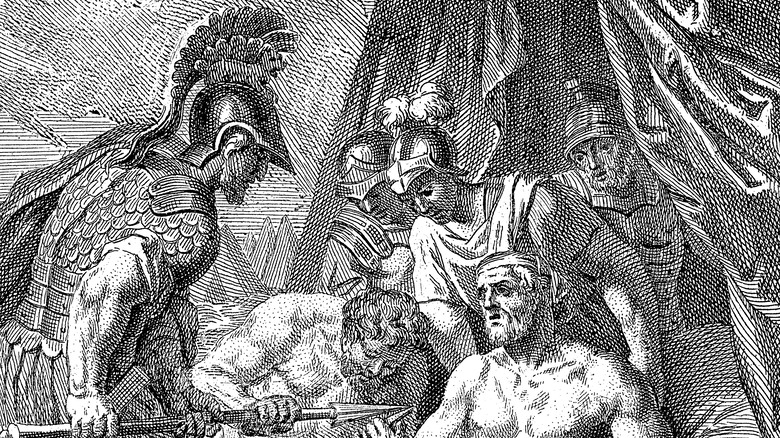The Greek Myth That The Movie Troy Was Based On
Over the decades, Hollywood has brought all kinds of books to the big screen, ranging from parts of the Bible to Stephen King novels to other works by bestselling authors like J.K. Rowling. It is a tricky thing to capture what people visualize on the written page and accurately portray it on the screen. Screenwriters and directors have to walk a tightrope, as they don't want to just regurgitate what is in the book. Yet, if they stray too far from the source material, they risk angering those who saw the movie because they liked the book.
The other issue that plagues adaptations is what they focus on when telling the story. Books are long. It can take days to read them. Unless it turns out that they are doing a television miniseries, the movies have to cut out a lot of the book and focus on certain storytelling beats to keep the audience's attention. Otherwise, they risk having a bloated product that will ensure that the audience tunes out sooner than later.
The movie "Troy," which starred Brad Pitt (via IMDb), had that problem, since it was based on "The Iliad," an epic poem by the ancient writer Homer. Epic means really, really long. This meant a lot of decisions had to be made about what was put in, what was changed, and what was just plain left out. The results were mixed, to say the least, according to Rotten Tomatoes.
Troy centers around Achilles
"The Iliad" is a tale of a war between a Greek army and the Trojan army. It all began when the cowardly Paris took King Menelaus' wife, Helen, to Troy to be his wife. This angered the king, and he sent his army to go fight a lengthy war to try to bring her back. Achilles is the invading army's greatest warrior, but he is sulking because his commander took some of his plunder from the latest battle. That is where the book starts. It also features a lot of the Greek gods, who step in and interfere. It was the goddess Aphrodite who started it because she allowed Paris to take Helen. Achilles is basically immortal due to being dipped in the river Styx, but he has a weak point, his heel, which was where his mother held him. Hence, the common phrase, Achilles' heel.
On the other hand, per Study, the movie did not feature the denizens of Olympus, and there were a lot of things that occurred in the movie that didn't happen in the book. The movie's director, Wolfgang Petersen, explained this by saying it was "inspired" by the book. Brad Pitt did bulk up considerably to play Achilles, and he set his broody pouty look to 11. Historical scholars may not have loved the finished product, but the audience did find it entertaining. People have to put aside their notions of historical accuracy here and just enjoy the film.

